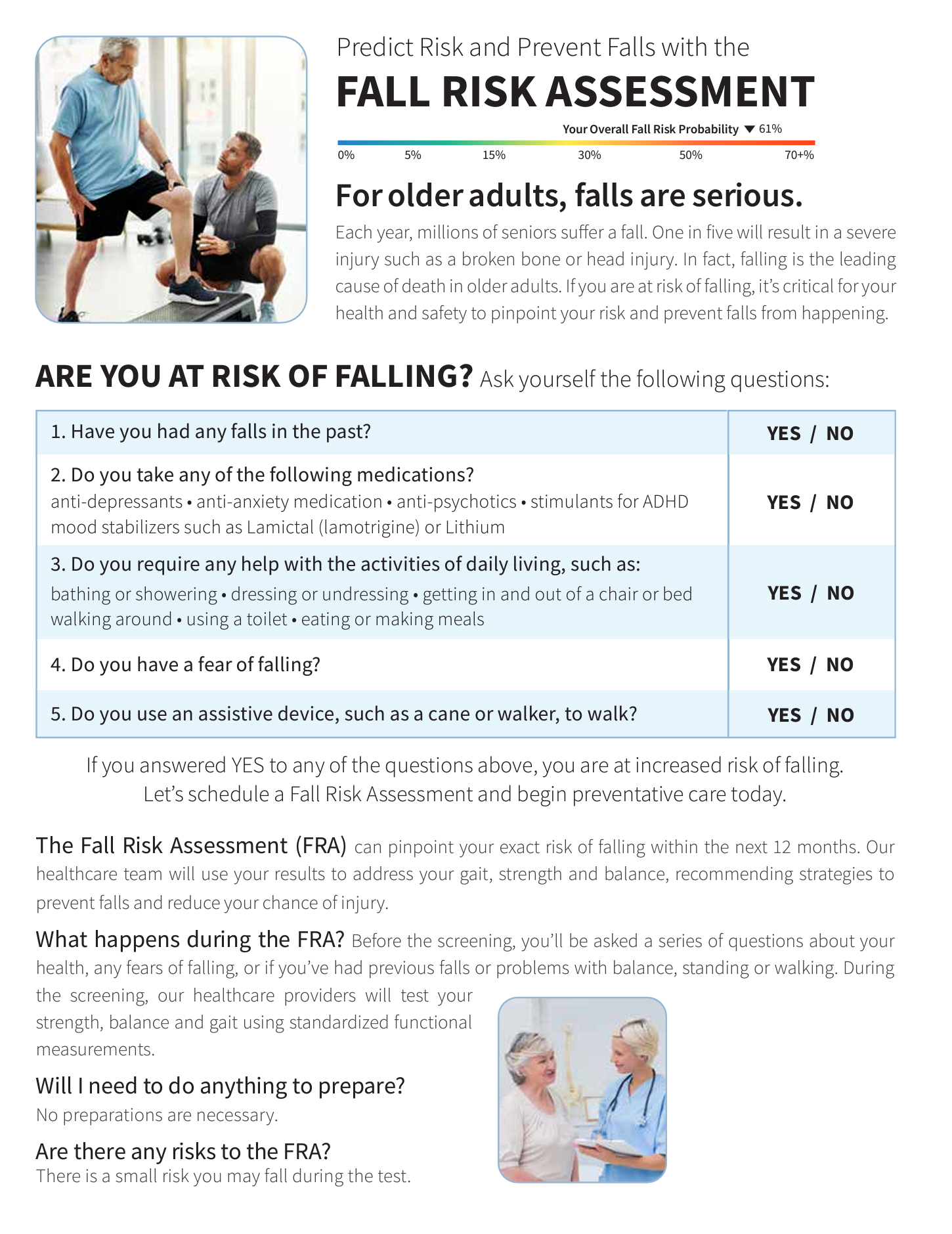The Ultimate Guide To Dementia Fall Risk
The Ultimate Guide To Dementia Fall Risk
Blog Article
Get This Report on Dementia Fall Risk
Table of ContentsExamine This Report on Dementia Fall RiskThe Single Strategy To Use For Dementia Fall RiskExamine This Report about Dementia Fall RiskThe Ultimate Guide To Dementia Fall RiskDementia Fall Risk for Beginners
The FRAT has three areas: drop threat status, danger aspect checklist, and activity plan. A Fall Risk Status consists of information regarding history of recent falls, medicines, mental and cognitive condition of the client - Dementia Fall Risk.If the individual scores on a danger factor, the matching number of points are counted to the person's loss risk rating in the box to the far ideal. If a client's fall danger score completes five or higher, the person goes to high danger for drops. If the client scores only four factors or lower, they are still at some danger of falling, and the nurse ought to use their best medical analysis to handle all fall threat variables as part of an alternative care plan.
These typical methods, as a whole, aid establish a risk-free environment that lowers unintentional falls and defines core safety nets for all people. Indicators are essential for patients at threat for falls. Doctor require to acknowledge that has the problem, for they are responsible for implementing actions to advertise individual security and prevent falls.
The Greatest Guide To Dementia Fall Risk
Wristbands ought to consist of the individual's last and initial name, day of birth, and NHS number in the UK. Only red color should be used to signify unique individual condition.
Items that are also much might require the individual to reach out or ambulate needlessly and can possibly be a danger or add to falls. Assists protect against the individual from heading out of bed with no support. Nurses react to fallers' phone call lights extra quickly than they do to lights started by non-fallers.
Visual disability can substantially trigger drops. Keeping the beds closer to the floor lowers the risk of falls and significant injury. Positioning the cushion on the floor considerably minimizes fall danger in some healthcare settings.
Getting The Dementia Fall Risk To Work
Clients who are tall and with weak leg muscular tissues that attempt to remain on the bed from a standing position are likely to drop onto the bed since it's too low for them to reduce themselves securely. If a high client read review attempts to obtain up from a reduced bed without help, the person is likely to drop back down onto the bed or miss out on the bed and fall onto the floor.
They're made to promote prompt rescue, not to stop drops from bed. Apart from bed alarm systems, boosted supervision for high-risk clients likewise may help avoid falls.

Individuals with a shuffling gait boost loss chances substantially. To lower fall risk, footwear must be with a little to no heel, thin soles with slip-resistant step, and sustain the ankle joints. Advise patient to use nonskid Click Here socks to protect against the feet from gliding upon standing. However, encourage clients to wear proper, well-fitting shoesnot nonskid socks for ambulation.
The Main Principles Of Dementia Fall Risk
In a research, homes with ample lighting record fewer falls (Ramulu et al., 2021). Renovation in lights at home may decrease fall prices in older adults.

Sitters are reliable for guaranteeing a protected, secured, and secure setting. Research studies demonstrated really low-certainty evidence that caretakers decrease loss risk in acute treatment health centers and only moderate-certainty that choices like video surveillance can decrease sitter use without boosting autumn threat, recommending that caretakers are not as valuable as at first thought (Greely et al., 2020).
The Of Dementia Fall Risk

Enhanced physical fitness reduces the threat for falls and restricts injury that is received when fall takes place. Land and water-based exercise programs may be likewise useful on balance and stride and thus reduce the threat for falls. Water workout might contribute a favorable advantage on equilibrium and gait for women 65 years and older.
Chair Surge Exercise is a simple sit-to-stand workout that helps reinforce the muscles in the upper legs and buttocks and boosts movement and freedom. The goal is to do Chair Surge exercises without making use of hands as the customer ends up being more powerful. See resources area for a comprehensive direction on exactly how to perform Chair Rise exercise.
Report this page